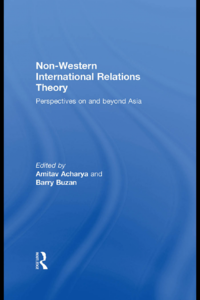Non-Western International Relations Theory. Perspectives on and beyond Asia. By Amitav Acharya and Barry Buzan (eds.). Routledge, 2009; 253 pages; R$88.06 (Kindle edition, Amazon.com.br)
“When was the last time a non-American thinker based at a non-American institution came up with an idea that changed the way we see the world?” a participant asked at last year’s G20 Foreign Policy Think Tanks Summit, held in Philadelphia. “Has there been any non-American idea in the past decade or two that had a true impact on global thinking, such as Samuel Huntington’s Clash of Civilization, Fukuyama’s End of History, or Joseph Nye’s Soft Power?
The inability to find a clear answer to these provocative questions points to an intriguing gap: While the world is heading towards economic multipolarity, our intellectual world is still fundamentally unipolar. The field of International Relations is dominated, like few other disciplines, by US-American thinkers and those based in US institutions. That does not mean that non-Western powers and thinkers made no important contributions. Quite to the contrary. Rather, it shows that IR theory has failed to embrace this evident reality.
While Martin Wight once asked “Why is there no international relations theory?”, Amitav Acharya and Barry Buzan ask a slightly different but even more timely question in this thought-provoking book: “Why is there no non-Western international relations theory?” The book project brings together a series of essays on international political thought in Asia. In their entirety, the collection provides a rich number of different viewpoints developed across the continent.
In separate chapters, readers learn about IR theorizing in China, Japan, Korea and Indonesia, among other states. The choice seems somewhat aleatory: Why is there no thinker from Central Asia, Turkey or Russia? The latter two relate to a larger, equally unresolved question: Who exactly is part of the non-West? From an institutional point of view, wouldn’t Japan, a member of the G7, be part of the West?
The assembled texts are an eclectic mix of considerations about theory and hands-on issues around research funding, and several writers bemoan the lack of funds comparable to those in the United States. The contributors also wonder whether their respective countries have IR theories they can call their own – here the assessments range from an explicit “no” in South Korea (due to strong US influence) to “yes, but” in India, where Behara argues that Indian IR theory has yet to be recognized internationally.
The book is able to address its guiding concern, the search for a non-Western international relations theory, much better than Wight was able to answer his original question. Though often inspired and influenced by intellectual concepts from abroad, the book reveals several ideas developed in India, Japan, South Korea and beyond.
And yet, the collection of essays raises as many questions as it solves. Is a non-Western IR theory possible? Considering that ‘Western’ IR theory developed through engaging with non-European actors, would it not be normal that ‘non-Western’ IR theory would be strongly influenced by European and US-American ideas as well? Is it possible to use Asia as a proxy for the non-West, arguing that Asia is the “only contemporary non-Western concentration of power and wealth comparable to the West”? (Personally, I believe that the book should have been called “Asian IR theory” instead, considering that there are both non-Western and non-Asian theories which are entirely different).
Furthermore, is a book specifically written about ‘non-Western’ IR theory not bound to be incomplete, just as a book on ‘Western IR theory’ will inevitably be limited to surface skimming? If, as Cox argues, “theory is always for someone and for some purpose”, why haven’t Asian thinkers developed their own theories for their own purposes more aggressively? Or does Western IR theory serve just as well for Asia’s purposes? And finally, as Asia’s aspiring academic elites are increasingly capable of studying at US institutions (particularly from places like China), aren’t the chances of the emergence of a stand-alone non-Western theory even lower than they were in the past, contrary to what the authors claim in the final chapter?
Despite these unanswered questions, the book is highly readable and quite useful when thinking about the effects of intellectual multipolarization on International Relations theory. As Acharya and Buzan rightly point out in the introduction, Western thinkers are far too dominant and universally read to make sense of global international dynamics. In this sense, the book marks an important step in globalizing the discipline.
Read also:
Book review: “The Boxer Rebellion and the Great Game in China” by David J. Silbey
Book review: “Governing the World: The history of an idea” by Mark Mazower









